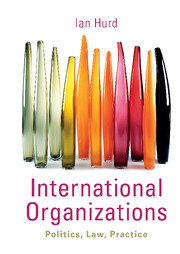Book contents
- Frontmatter
- Contents
- Preface
- Acknowledgement
- 1 Introduction to international organizations
- 2 A guide to the study of international organizations
- 3 The World Trade Organization
- 4 The International Monetary Fund and the World Bank
- 5 The United Nations I
- 6 The United Nations II
- 7 The International Labor Organization
- 8 The International Court of Justice
- 9 The International Criminal Court
- 10 Regional Organizations
- 11 Conclusion
- Index
2 - A guide to the study of international organizations
- Frontmatter
- Contents
- Preface
- Acknowledgement
- 1 Introduction to international organizations
- 2 A guide to the study of international organizations
- 3 The World Trade Organization
- 4 The International Monetary Fund and the World Bank
- 5 The United Nations I
- 6 The United Nations II
- 7 The International Labor Organization
- 8 The International Court of Justice
- 9 The International Criminal Court
- 10 Regional Organizations
- 11 Conclusion
- Index
Summary
International organizations shape the politics and controversies among countries in a number of ways. They can be powerful forces in their own right, as when an international court decides that a state is violating its legal obligations or when the UN sends peacekeepers to intervene in a conflict. They can also be centers where diplomacy and negotiation among states take place – this “forum” role accounts for part of the importance of the World Trade Organization and of the UN General Assembly. In still other situations, international organizations provide the tools or resources by which countries try to advance their interests in world politics. These diverse functions mean that the relations between states and their international organizations can be studied from very different perspectives, producing insights with very different emphases.
International organizations are diverse and sophisticated entities, with overlapping and conflicting social, legal, and political dimensions. They vary widely in their substantive areas of authority, their internal structures, and their political salience. Their complexity allows for an equally complex field of study in which contrasting perspectives offer distinct emphases and different tools of analysis and which therefore come to very different interpretations of the same real-world patterns. This chapter presents a guide to the academic study of international organizations, centered on two sets of debates: what kinds of entities are international organizations? and what are the appropriate methods to study them?
- Type
- Chapter
- Information
- International OrganizationsPolitics, Law, Practice, pp. 15 - 36Publisher: Cambridge University PressPrint publication year: 2010



